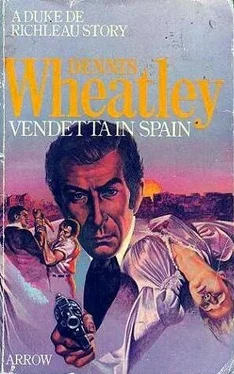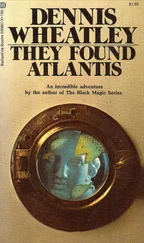At first she regarded him with obvious suspicion, but he talked with such intimate knowledge of her father's friends that after a little she thawed out. She told him that in the summer of 1906 the group had been betrayed by a French spy, which had resulted in the Escuela Moderna being raided and closed, and that for a year the activities of the group had been brought almost to a standstill through most of them being in prison. She added that Barbestro had been shot for an attempt on General Quiroga and Sanchez Ferrer killed in a brawl in Cadiz.
He then asked her about the recent revolt. She described some fights that had taken place locally and the brutality with which the soldiers had treated the workers after they had forced the barricades. Several of her friends had been killed or wounded, and her husband had been among the latter, although fortunately the bullet that hit him had only taken off the lobe of his left ear. She added that, what with the fighting and the arrests that had taken place after it, the ranks of the anarchists had been sadly thinned, and those who had escaped were now all in hiding.
Having deplored this sad state of things, he remarked what hard luck it was on him that the revolt should have taken place only a few weeks before his return, and so deprived him of the chance to renew his old friendships; then he said in his most winning tone:
'But perhaps you could put me in touch with some of them, or know people who could. How about Benigno Ferrer? I hope he is all right. He was a particular friend of mine.'
She shook her head. 'I've no idea where Benigno is; but he wasn't killed or captured in the revolt. I believe that during it he was somewhere abroad.'
'His father then? I take it Senor Ferrer is still safe. He is so well known that had ill befallen him it's certain that I should have seen it in the papers, or anyhow have heard about it from someone.'
'No; Francisco's all right. It was him really who I knew better than any of them. Of course he was much older than me; but as a matter of fact we were great friends.'
De Richleau gave her a slightly doubting smile and said, 'I suppose anything is possible for such a good-looking girl as you. But do you really mean to tell me that you succeeded in securing as an admirer such a famous intellectual as Francisco Ferrer?'
She bridled with pleasure and pointed to the thumb-sucker who was standing in the doorway. 'If you really want to know, I had little Francisco, there, by him. These other two are Irujo's; but I only married him really to give my eldest a father.'
'I hope he makes the boy a good one.'
'Might be worse, I suppose.' She made a grimace. 'It's only when he's had a skinful of wine that he gets jealous and would ill-treat the kid if I didn't watch out. Otherwise he just ignores him and is glad enough to pocket the money Ferrer sends me for the boy's keep.'
'Ferrer does the decent thing by you, then. Does he ever come to see you and little Francisco?'
'Oh yes. Ferrer's fond of children, and after he got his school going again he used to look in fairly regularly. He hasn't been here since the revolt, though.'
'I hope he sends you your money just the same.'
'Yes. That Mendoza woman you were talking about a while back brings it. He's living with her now.'
'Since you know where they are I'd be awfully grateful if you'd give me their address, so that I can look them up.'
De Richleau had made his request sound as casual as he could, and to conceal the intense excitement with which he awaited her answer he glanced away from her towards the baby she was holding. When her reply came it was disappointing. After hesitating a moment, she said:
'No; I couldn't do that. You see, I don't really know anything about you, do I? And there's a big reward for his capture. For all I know you might be trying to earn it, or even be one of the police.'
He knew that if she would not talk he had only to arrest her and turn her over to Urgoiti. Quiroga had told him that under the fortress of Montjuich there were dungeons that had been handed over to the secret police in which they held and questioned political prisoners. He had a pretty shrewd idea that the methods used were not far short of the tortures inflicted in those same dungeons during the Middle Ages. Without a doubt they would get out of her the information he was so anxious to obtain; but he thought her a very decent woman and was most loath to bring such a fate upon her.
Deciding to try further persuasion, he laughed and said, 'Oh come, now! You're talking nonsense. I . . S
At that moment a window pane shattered. He was standing sideways on to it with his back to the open doorway. As the glass tinkled down he glimpsed a black object, about the size of a cricket ball, spinning down into the room. Instantly, he flung himself backwards.
Next second there came the crash of an explosion. A bright orange flash lit the dingy little room. Teresa gave a piercing scream. Dense black smoke billowed up from the floor swiftly spreading and obscuring the scene.
De Richleau's backward plunge had sent little Francisco spinning. The boy burst into howls. Ignoring him the Duke picked himself up and, unhurt except for bruising one elbow, plunged back into the smoke-filled room. Teresa had dropped her baby and collapsed groaning across a small stiff-backed settee. Her skirt was on fire. Snatching up a cushion de Richleau beat out the flames with it, then got his arms beneath her and carried her across the passage to the kitchen. As he did so, through the murk he glimpsed other flames and realized that some of the lighter furniture must have also caught fire from the explosion.
By that time several women neighbours and Veragua had rushed into the cottage. Still choking from the fumes, the Duke shouted to them to get the children and to him to take charge and put out the fire. Meanwhile he had laid Teresa on the floor and, with the swift practised fingers of one who has tended many wounded on battle-fields, was assessing her injuries.
The bomb must have exploded on her right almost at her feet. On that side only charred and tattered remnants of her skirt and petticoats remained, exposing her legs to the thigh. The right one was hopelessly shattered, the left one was also scorched and bleeding. Grabbing a kitchen knife he slit the leather belt she was wearing, then tore open her corset. As he had feared, several bomb splinters had lodged in her right hip and that side of her stomach. Springing up he seized a towel to staunch the blood that was seeping from the wounds.
At that moment a wild-eyed woman burst into the kitchen.
In her arms she was carrying the limp form of Teresa's second child. Hysterically she shouted, The poor mite's dead! She's dead! And so's the baby. Oh, Holy Saints defend us!' Then at the sight of Teresa half naked and bleeding on the floor she uttered another wail, turned, and ran from the room.
After her first screams Teresa had uttered only a low moaning, then fallen silent. De Richleau thought she had fainted, but at the shouts of her neighbour she opened her eyes. As he again knelt beside her she asked in a hoarse whisper, 'Francisco. Is he ... Is he . . .?'
A sweat had broken out on her forehead and the Duke knew that she had not long to live. Kneeling beside her he said gently, 'He is safe, Teresa. As with myself the angle of the wall saved him from injury. But you, Teresa. You have not long and you must think of his future.'
He had her head pillowed on his arm and she nodded weakly. 'Yes ... I don't want to die . . . I'm afraid to die . . . But the pain inside me ... I... I know I'm finished.'
'You cannot leave the boy to Irujo. Not if Irujo would be unkind to him. Let me take him to Ferrer for you. Ferrer loves him and will see to it that he is given a happy home. But you must tell me where to find Ferrer.'
Читать дальше












